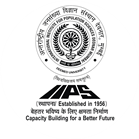- About IIPS
- Academics
- Study @ IIPS
- Departments
- Centres
- Controller of Examination
- Programme
- Distance and Online Education
- Training
- Facilities/Services
- Resources
- Virtual Learning
- Digital Initiatives (MHRD)
- Notice
- Seminars / Workshops / Conferences
- Conferences
- Publications
- Seminars
- Sponsored Research
- Workshops
- Collaboration
- National
- International
- NEP 2020
- Admission
- Courses
- Admission Bulletin
- TIME-TABLE For Admission 2025-26
- Model Question Papers
- Programme Coordinators
- Fellowships
- Academic Calendar
- International Students
- Visa Information
- Administration
- Faculty & Staff
- Research & Publications
- Library
- Information
- Right to Information
- Vigilance Officer
- Annual Report
- Director's Report
- Cells & Commitees
- Cells
- Commitees
- Committees of NEP 2020
- Staff Walfare Committee
- Cultural Committee
- Internal Committee
- Purchase Commitee
- Students Academic Committee
- Student Research Ethics Committee
- Anti-Ragging Committee
- Institutional Review Board
- Social Media Committee
- Prevention of Caste-based Discrimination Committee
- Code of Conduct and Professional Ethics
- National and International honours, Awards, Recognition, and Medals
- Online Facilities
- Employee's Corner
- Memorial Lectures
- Convocation
- IIPS Newsletters
- COVID 19 Information
- Life @ IIPS
Internal migration in Maharashtra, with special reference to Mumbai
- Home
- Internal migration in Maharashtra, with special reference to Mumbai
Abstract Content (not more than 300 word, should include: Introduction, Objective, Methodology, critical findings & Conclusion):
Migration is a key determinant of population change and plays a critical role in shaping economic, social, and cultural development. Maharashtra, a significant destination for migrants, hosts a diverse range of migrants from both within the state and across India. According to the 2011 Census, Maharashtra is home to 16.3% of India's total rural-to-urban migration, with Mumbai serving as a primary destination. The research paper explores the dynamics of internal migration in Maharashtra, with a special focus on Mumbai analysis Census of India data 1991-2011. The study examines the socio-economic factors that influence migration patterns, highlighting the distinct motivations for migration among males and females. A substantial proportion of intra-state migration occurs within urban districts such as Thane, Pune, and Mumbai Suburban, pointing to the urban agglomeration process in the state.
Employment and marriage are the primary reasons for migration, with rural migrants being more likely to move for employment-related opportunities than their urban counterparts. Migrants in Mumbai are predominantly engaged in sectors such as wholesale and retail trade, construction, accommodation and food services, and real estate. These findings suggest that migration not only redistributes population but also influences the labour market and the socio-economic structure of the city.
The study highlights the need for further research to understand the complexities of migration, particularly in terms of the reasons behind migration that remain unclassified in the Census data. It also underscores the importance of migration in shaping urban and economic policies for sustainable development in cities like Mumbai.
Abstract theme:
In case of not been selected for oral presentation, do you want to be considered for the poster presentation ?:
No
Do you require financial support to attend the seminar ? (Not applicable for virtual meet):
Yes-full
Gender:
Male
Evaluation Status:
No
